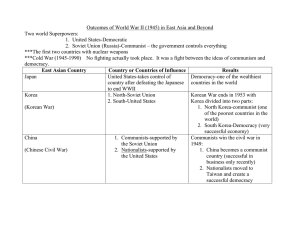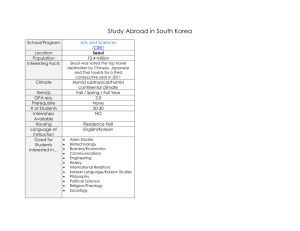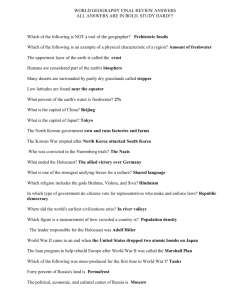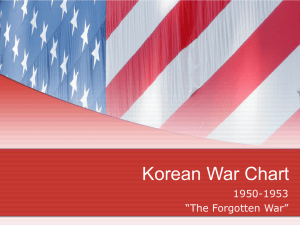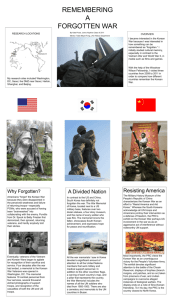T K W A R H E
advertisement
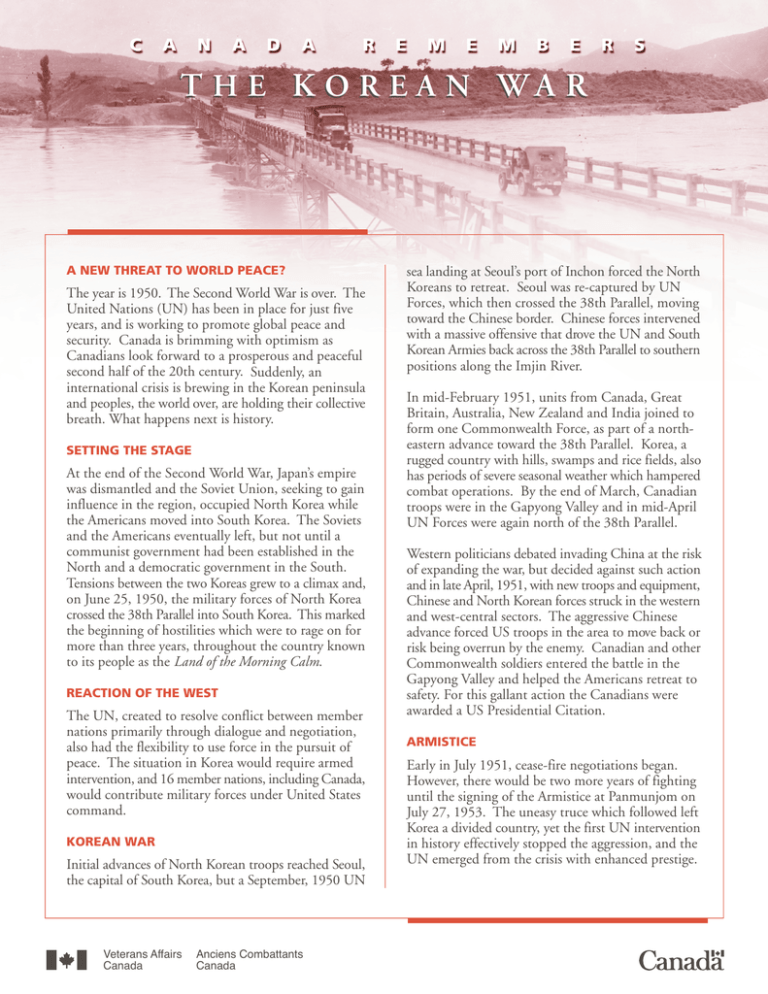
T H E K O R E A N WA R A NEW THREAT TO WORLD PEACE? The year is 1950. The Second World War is over. The United Nations (UN) has been in place for just five years, and is working to promote global peace and security. Canada is brimming with optimism as Canadians look forward to a prosperous and peaceful second half of the 20th century. Suddenly, an international crisis is brewing in the Korean peninsula and peoples, the world over, are holding their collective breath. What happens next is history. SETTING THE STAGE At the end of the Second World War, Japan’s empire was dismantled and the Soviet Union, seeking to gain influence in the region, occupied North Korea while the Americans moved into South Korea. The Soviets and the Americans eventually left, but not until a communist government had been established in the North and a democratic government in the South. Tensions between the two Koreas grew to a climax and, on June 25, 1950, the military forces of North Korea crossed the 38th Parallel into South Korea. This marked the beginning of hostilities which were to rage on for more than three years, throughout the country known to its people as the Land of the Morning Calm. REACTION OF THE WEST The UN, created to resolve conflict between member nations primarily through dialogue and negotiation, also had the flexibility to use force in the pursuit of peace. The situation in Korea would require armed intervention, and 16 member nations, including Canada, would contribute military forces under United States command. KOREAN WAR Initial advances of North Korean troops reached Seoul, the capital of South Korea, but a September, 1950 UN Veterans Affairs Canada Anciens Combattants Canada sea landing at Seoul’s port of Inchon forced the North Koreans to retreat. Seoul was re-captured by UN Forces, which then crossed the 38th Parallel, moving toward the Chinese border. Chinese forces intervened with a massive offensive that drove the UN and South Korean Armies back across the 38th Parallel to southern positions along the Imjin River. In mid-February 1951, units from Canada, Great Britain, Australia, New Zealand and India joined to form one Commonwealth Force, as part of a northeastern advance toward the 38th Parallel. Korea, a rugged country with hills, swamps and rice fields, also has periods of severe seasonal weather which hampered combat operations. By the end of March, Canadian troops were in the Gapyong Valley and in mid-April UN Forces were again north of the 38th Parallel. Western politicians debated invading China at the risk of expanding the war, but decided against such action and in late April, 1951, with new troops and equipment, Chinese and North Korean forces struck in the western and west-central sectors. The aggressive Chinese advance forced US troops in the area to move back or risk being overrun by the enemy. Canadian and other Commonwealth soldiers entered the battle in the Gapyong Valley and helped the Americans retreat to safety. For this gallant action the Canadians were awarded a US Presidential Citation. ARMISTICE Early in July 1951, cease-fire negotiations began. However, there would be two more years of fighting until the signing of the Armistice at Panmunjom on July 27, 1953. The uneasy truce which followed left Korea a divided country, yet the first UN intervention in history effectively stopped the aggression, and the UN emerged from the crisis with enhanced prestige. CANADA’S CONTRIBUTION As with the two world wars that preceded Korea, Canadians volunteered for military service far from home. Canada’s military contribution was larger, in proportion to its population, than most other UN participants. But throughout its brief history, isn’t this the continuing story of Canada’s efforts to achieve world peace? While honouring its military obligations, Canada has continued to promote dialogue and negotiation as the first option to solve global issues. THE SACRIFICE 2003 marks the 50th Anniversary of the Korean War Armistice. Canada, as a nation, owes an everlasting debt of gratitude to those young men and women who, in the prime of their youth, have served and continue to serve their country in times of war and peace to preserve global peace and protect fundamental human rights. Many paid the ultimate sacrifice, with their lives, and lie buried in countries far from their homes and loved ones. Many have returned from service with injuries to body and mind that they must carry with them for the rest of their lives. The names of 516 Canadian war dead are inscribed in the Korean War Book of Remembrance located in the Peace Tower in Ottawa. WE WILL REMEMBER THEM On November 11 of each year, the nation pauses to remember those who have served Canada during times of war and peace. However, to truly understand what impact that service has had on the peaceful nation of Canada and on the Canadian way of life, we must capture and extend the significance of Remembrance Day to other commemorative activities, events and projects throughout the country all year long. This is the least that Canada can do to honour and respect those who have served. In the coming months, Canadians from across the country will take time to honour, in a multitude of ways, their fellow citizens who served during the Korean War. The fallen will be remembered, their achievements and sacrifices acknowledged, and the lessons learned passed on to a new generation of Canadians. THE LEGACY The collective experiences and stories of Canada’s Veterans provide Canadians with a proud and lasting legacy that will continue into the country’s future. Remembering and reflecting on the significance of the contribution they made, and continue to make, strengthens the commitment to preserve the values that they fought and died for - truth, justice, peace, freedom and knowledge. Values that help to define Canadians and Canada. The Korean War marked a new stage in Canada's development as a nation. Since the end of the war, Canada has contributed to peacekeeping operations around the world in an effort to promote international freedom and maintain world peace. To learn more about Canada’s role in the Korean War, please visit the Veterans Affairs Canada Web site at: www.vac-acc.gc.ca or call 1-877-604-8489 to get the publication Canadians in Korea. CANADA REMEMBERS PROGRAM The Canada Remembers Program of Veterans Affairs Canada encourages all Canadians, but especially Canadian youth, to learn about the sacrifices and achievements made by Canada's Veterans, during times of war and peace, and to become involved in remembrance activities that will help to preserve their legacy for future generations of Canadians.
